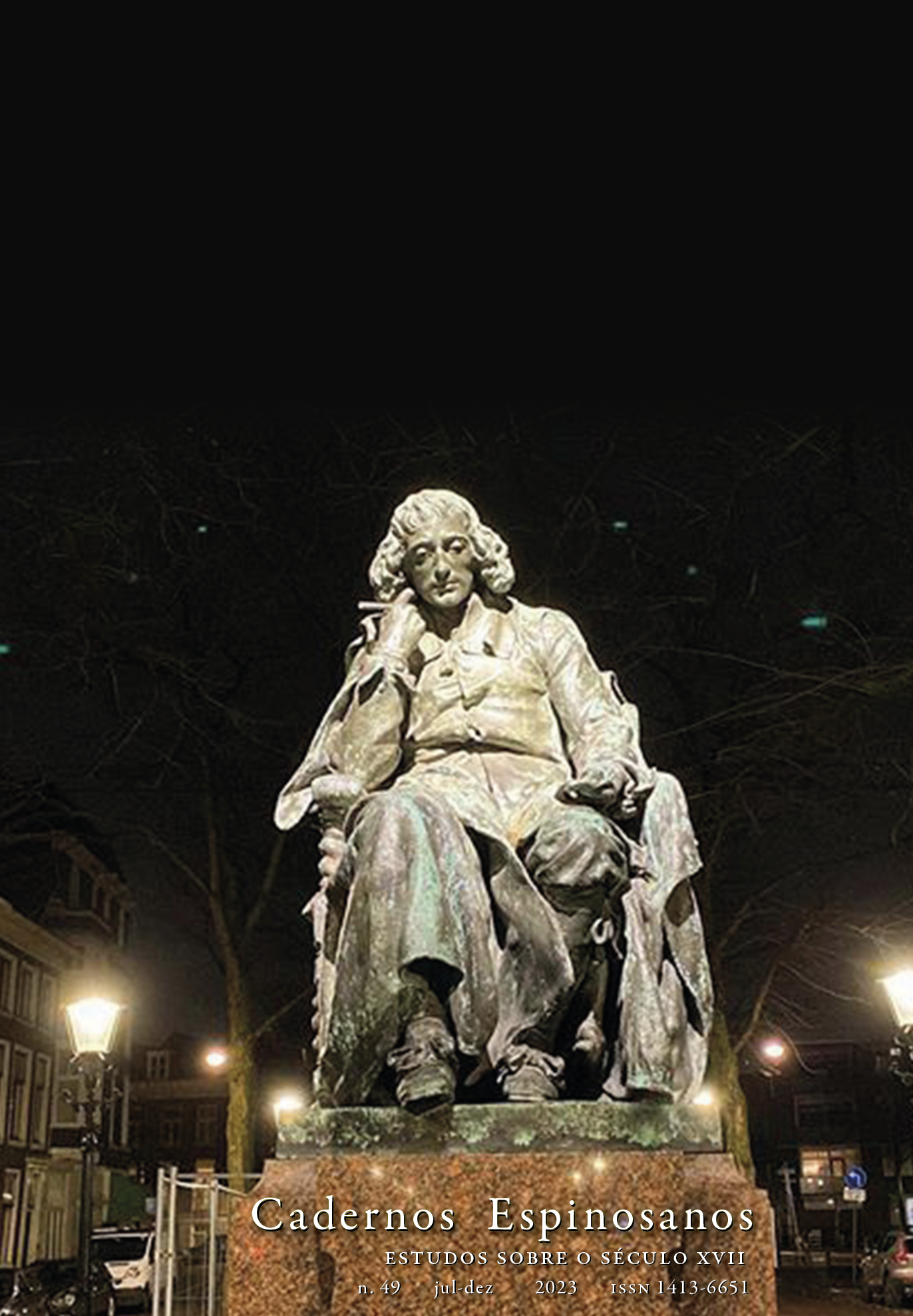The resolution of a new way of life in Spinoza and Pascal
DOI:
https://doi.org/10.11606/issn.2447-9012.espinosa.2023.216013Keywords:
Spinoza, Pascal, Emendation of the intellect, Grace, Immanence, TranscendenceAbstract
Spinoza and Pascal, respectively in the prologue to the Treatise on the Emendation of the Intellect and in the opuscule On the Conversion of the Sinner, explain a process that involves the establishment of a new way of life and represents a profound renewal of values for the soul. In this explanation, both authors address topics such as the concern for a true good, the disturbance of the soul between this concern and the search for other types of pleasure, the firm resolution to seek a true good and the way to achieve it. However, the conditions of this process seem to take different places, since in Spinoza the resolution to seek the supreme good is inseparable from the effort to reflect on it, while in Pascal the conversion of the sinner does not take place without the intervention of grace. The question is therefore to understand the foundations of the establishment of a new way of life that share common features, but does not seem to be equivalent for these authors.
Downloads
References
ALQUIÉ, F. (1981). Le rationalisme de Spinoza. Paris: Presses Universitaires de France.
BRUNSCHVICG, L. (1971). Spinoza et ses Contemporains. Paris: Presses Universitaires de France.
CHAUI, M. (1999). A Nervura do Real: imanência e liberdade. Vol. I. São Paulo: Companhia das Letras.
ESPINOSA, B. (1987). Tratado da Reforma do Entendimento. Introdução e notas de A. Koyré. Tradução da edição francesa por Abílio Queirós. Lisboa: Edições 70.
ESPINOSA, B. (2004). Tratado da Reforma da Inteligência. Tradução, introdução e notas de Lívio Teixeira. São Paulo: Martins Fontes.
ESPINOSA, B. (2015). Tratado da Emenda do Intelecto. Edição em latim e em português. Tradução de Cristiano Novaes de Rezende. Campinas: Editora Unicamp.
ESPINOSA, B. (2023). Tratado da Emenda do Intelecto. Contendo também a Correspondência completa entre Espinosa, Tschirnhaus e Schuller e outras cartas conexas; A medicina da mente por E. W. von Tschirnhaus. Tradução de Samuel Thimounier. Prefácio, tradução, introdução e posfácio de Cristiano Novaes de Rezende. Revisão técnica de Luís César Oliva. Belo Horizonte: Autêntica Editora.
GOUHIER, H. (2005). Blaise Pascal: conversão e apologética. Tradução de Éricka Itokazu e Homero Santiago. São Paulo: Discurso Editorial.
JAQUET, C. (2017). Spinoza ou la prudence. Paris: Éditions du Retour.
MOREAU, P.F. (1994). Spinoza: l’expérience et l’éternité. Paris: Presses Universitaires de France.
OLIVA, L. C. G. (1996). A questão da graça em Blaise Pascal. Dissertação de mestrado. Apresentada ao Departamento de Filosofia da Faculdade de Filosofia, Letras e Ciências Humanas. São Paulo: Universidade de São Paulo.
OLIVA, L. C. G. (2004). As marcas do sacrifício: um estudo sobre a possibilidade da história em Pascal. São Paulo: Associação Editorial Humanitas.
OLIVA, L. C. G. (2012). A noção de graça em Blaise Pascal. Cadernos Espinosanos, (26), 25-45.
PASCAL. (1954). Oeuvres Complètes. Texte établi et annoté par j. Chevalier. Blibliothèque de la Pléiade. Paris: Librarie Gallimard.
PASCAL. (1963) Oeuvres Complètes. Préface d’Henri Gouhier. Présentation et notes de L. Lafuma. Paris: Éditions Seuil.
PASCAL. (1973). Pensamentos. Tradução de Sérgio Milliet, numeração Brunschvicg. São Paulo: Abril Cultural. Coleção Os pensadores.
PASCAL. (1991). Oeuvres Complètes. Tome III. Texte établi, présenté et annoté par J. Mesnard. Paris: Desclée de Brouwer.
PASCAL. (1992). Oeuvres Complètes. Tome IV. Texte établi, présenté et annoté par J. Mesnard. Paris: Desclée de Brouwer.
PASCAL. (2000). Oeuvres Complètes. Tome II. Éditon présentée, établie et annotée par M. Le Guern. Paris: Éditions Gallimard.
PASCAL. (2014). “Sobre a conversão do pecador”. In: Conversa com o Senhor de Sacy sobre Epiteto e Montaigne e outros escritos. São Paulo: Alameda.
SPINOZA. (1954). Oeuvres Complètes. Texte traduit, présenté et annoté par Roland Caillois, Madeleine Francès et Robert Misrahi. Paris: Éditions Gallimard.
SPINOZA. (1988). Tratado de la Reforma del Entendimiento. Introducción y notas de Atilano Domínguez. Madrid: Alianza Editorial, S.A.
SPINOZA. (1992). Traité de la Réforme de l’Entendement. Introduction, traduction et commentaire par B. Rousset. Paris: Vrin.
SPINOZA. (2002). Treatise on the Emendation of the Intellect. Complete Works. Translation by Samuel Shirley. Edited with Introduction and notes by M. L. Morgan. Indianapolis/Cambridge: Hackett Publishing Company.
SPINOZA. (2003). Traité de la Réforme de l’Entendement. Introduction, traduction et commentaire par A. Lécrivain. Paris: Éditions Flammarion.
SPINOZA. (2007). Trattato sull’Emendazione dell’Intelleto. Spinoza opere. A cura e con un saggio introduttivo di Filippo Mignini. Traduzioni e note di Filippo Mignini e Omero Proietti. Milano: Arnoldo Mondadori Editore.
SPINOZA. (2009). Traité de la Réforme de l’Entendement. Texte établi par Filippo Mignini. Traduction et notes par Michelle Beyssade. In: Oeuvres, Tome I, premiers écrits. Paris: Presses Universitaires de France.
SPINOZA. (2022). Traité de la Réforme de l’Entendement. Traduction et notes par C. Appuhn. Paris: Garnier Flammarion (réédition).
Downloads
Published
Issue
Section
License
Copyright (c) 2023 Gabriel Frizzarin

This work is licensed under a Creative Commons Attribution-NonCommercial-ShareAlike 4.0 International License.
Autores que publicam nesta revista concordam com os seguintes termos:
- Autores mantém os direitos autorais e concedem à revista o direito de primeira publicação, com o trabalho simultaneamente licenciado sob a Licença Creative Commons Attribution que permite o compartilhamento do trabalho com reconhecimento da autoria e publicação inicial nesta revista.
- Autores têm autorização para assumir contratos adicionais separadamente, para distribuição não-exclusiva da versão do trabalho publicada nesta revista (ex.: publicar em repositório institucional ou como capítulo de livro), com reconhecimento de autoria e publicação inicial nesta revista.
Authors who publish in this journal agree to the following terms:
b. Authors are authorized to take on additional contracts separately, to non-exclusive distribution of the article published in this journal (ex.: to publish in institutional repository or as part of a book), with an acknowledgment of its initial publication in this journal.
How to Cite
Funding data
-
Fundação de Amparo à Pesquisa do Estado de São Paulo
Grant numbers nº 2022/16875-5


